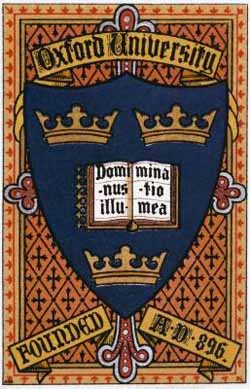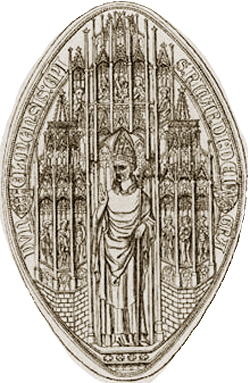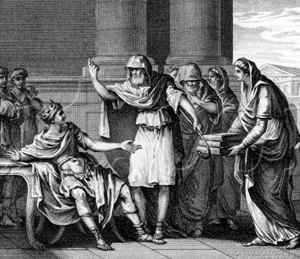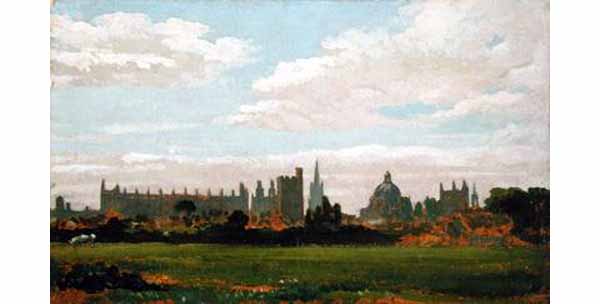Richard de Bury studied at Oxford University in the 13th century, and later became tutor to Prince Edward of Windsor, afterwards Edward III. On the accession of his pupil, he held various important posts, including ambassador to the Pope, who appointed him Bishop of Durham.

The Oxford coat of arms - Dominus Illuminatio mea (God is my light) |
The Bishop was a great lover of good books, and completed his treatise on books, titled The Philobilon [The Friend of Books], on his 58th birthday, the year he died. He had a separate library in each of his residences, and wherever he was residing, so many books lay about his bedchamber that it was hardly possible to move without treading upon them. Every day during his meals he would have a book read to him, and afterwards would engage in discussion with his guests on the topic of the reading.
So much for the critics who pretend no one was literate or read books in the so-called “Dark Ages” – which was really the Age of Light since then learning was elucidated by the Faith.
In chapter I of The Philobilon, Richard de Bury explains the treasures of wisdom contained in good books, which are depositories of intelligence and science:
“The desirable treasure of wisdom and science, which all men desire by an instinct of nature, greatly surpasses all the riches of the world. In respect to it, precious stones are worthless; silver is as clay and pure gold is as a little sand. In comparison with its splendor, the sun and moon are dark to look upon, and next to its marvelous sweetness honey and manna are bitter to the taste. O value of wisdom that does not fade away with time, propitiates virtue to ever flourish, and cleanses its possessor from all venom!”
What makes good books so valuable? He explains: “In books I find the dead as if they were alive. I foresee things to come. In books warlike affairs are set forth; and from them the laws of peace sprout. … All the glory of the world would be buried in oblivion had God not provided mortals with the remedy of books.”

The seal of the Bishop de Bury, below his cathedral of Durham founded in the 11th century
 |
In chapter II, de Bury explains the proper admiration owed to books. Since neither riches nor delights are to be preferred to wisdom, and wisdom is found in books, their value is priceless.
He writes: “Since the degree of esteem a thing deserves depends upon the degree of its value, and the previous chapter shows that the value of good books is indescribable, it is quite clear to the reader what is the probable conclusion from this. …
“Now truth is chiefly maintained and contained in holy books - for they are written truth itself. … Wherefore riches are less than books, especially as the most precious of all riches are friends, as Boethius testifies in the second book of Consolation. And, even with regard to friends, the truth is to be preferred, according to Aristotle. Moreover, we know that riches supports the body only, while the virtue of books helps to perfect the reason, in which properly speaking the happiness of man resides. Therefore, to the man who uses his reason, books are dearer than all riches.
“Furthermore, that by which the faith is more easily defended, more widely spread, more clearly preached, ought to be more desirable to the faithful. And this is the truth written in books, which our Savior plainly showed when He was about to contend stoutly against the Tempter, girding himself with the shield of truth and indeed of written truth, declaring "it is written" of what he was about to utter with his voice. …
“Moreover, since books are the best teachers, as the previous chapter affirms, it is fitting to bestow on them the honor and the esteem that we owe to our teachers. In short, since all men naturally desire to know, and since by means of books we can attain the knowledge of the ancients, what man would not feel the desire for books? And although we know that swine trample pearls under foot, the wise man will not be deterred from gathering the pearls that lie before him.
“A library of wisdom, then, is more precious than all wealth, and all things that are desirable cannot be compared to it. Whoever, therefore, claims to be zealous of truth, happiness, wisdom or knowledge, aye, even of the faith, needs to become a friend of books.”
The proud King of Rome
In chapter III, the Bishop of Durham relates a story from antiquity to prove that the wise man should not hesitate to purchase good books, even if the price is high.
“From what has been said we draw this corollary welcome to us, but (as we believe) acceptable to few: Namely, that no dearness of price ought to hinder a man from buying good books, if he has the money that is demanded for them. … For if the value of books is inestimable, as the premises show, how can the cost be considered high where an inestimable good is being bought?
“That books are to be gladly bought and unwillingly sold, Solomon, the sun of men, exhorts us in Proverbs: Buy the truth, he says, and sell not wisdom. But, what we are trying to show by rhetoric or logic, let us prove by examples from history. …

Tarquin loses six, but finally buys the three last books |
“Let us relate the folly of Tarquinius Superbus, or Tarquin the Proud, in despising books, as also related by Aulus Gellius. An old woman, utterly unknown, is said to have come to Tarquin, the seventh King of Rome, offering to sell nine books, which she declared contained sacred oracles.
“But she asked an immense sum for them, so much that the King said she was mad. In anger she flung three books into the fire, and still asked the same sum for the rest. When the King refused it, again she flung three others into the fire and still asked the same price for the three that were left. At last, astonished beyond measure, Tarquin was glad to pay for three books the same price for which he might have bought nine.
“The old woman straightway disappeared, and was never seen after. These were the Sibylline books, which the Romans consulted as a divine oracle by one of the Quindecem viri [Fifteen men], and this is believed to have been the origin of the Quindecem viratus [Government of the Fifteen].
What did this Sibyl teach the proud King by this bold deed, except that the vessels of wisdom, holy books, exceed all human estimation; and, as Gregory says of the kingdom of Heaven: “They are worth all that thou hast”

Oxford University was founded in the 11th century and became an illustrious center of learning
|
Adapted from Richard de Bury, The Philobiblon,
Trans. E. C. Thomas, Project Gutenberg, Chaps. 1-3

Posted November 12, 2011
|